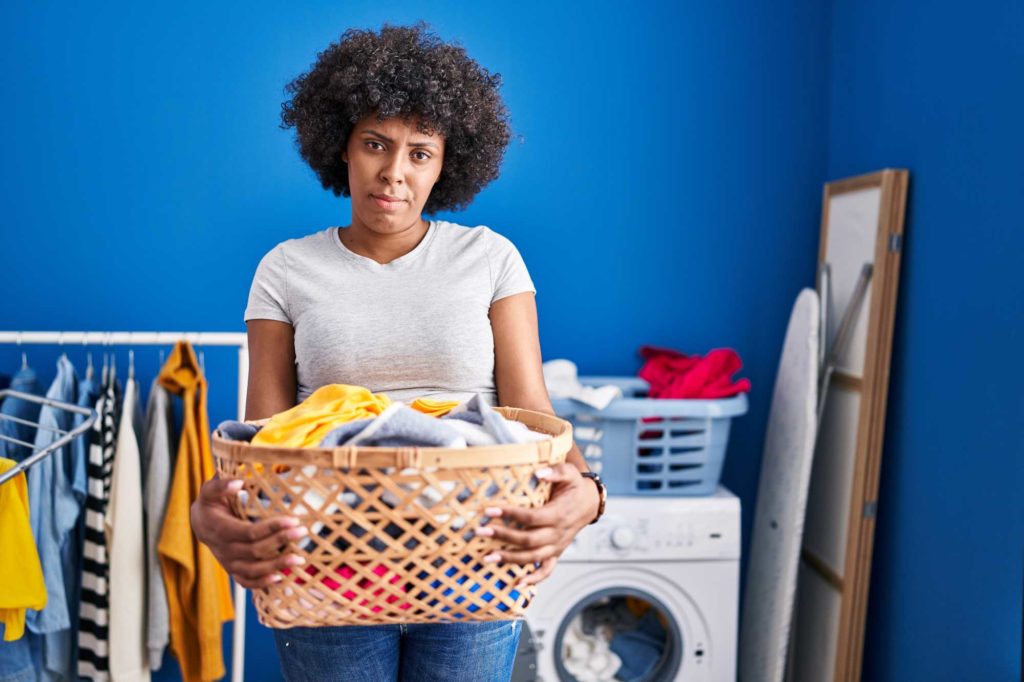
*The following post is written by Karen Johnson, author of What Do I Want to Be When They Grow Up? (And Other Thoughts From a 40-Something Mom).
Do you ever feel like you’re the only person in your household with working eyeballs? Like, clearly the other human beings who live in this house MUST see the dirty towels on the bathroom floor. Or the basket full of folded laundry, waiting to be put away. Or the overflowing sink full of dirty dishes. They have to, right? They actually have to walk AROUND the laundry basket. You watched as they precariously balanced their breakfast cereal bowl atop Dirty Dishes Mountain this morning. And they stepped ON the dirty towels while they brushed their teeth!
And yet, far too often, the other members of your family pass right on by those dirty, wet towels. And the piles of laundry. And the overflowing sink of dishes. And whatever else mess they see (or apparently don’t see)—but mess that they definitely, 100% contributed to.
So when Mom finally snaps and loses her shit, angrily gathering towels and slamming dresser drawers shut as she puts away clean clothes and furiously scrubs dirty pots and pants, muttering to herself about how she’s “the not the maid!” and her children, seemingly confused about their mother’s ire, have the audacity (and frankly, stupidity) to retort with something like, “Geez. Why is Mom so mad?”… Well, that’s when they really start seeing smoke come out of her ears. It is in that moment that she morphs into a dragon and breathes fire, making them run for cover.
But here’s the thing—kids are kids. They are part completely oblivious and part “I don’t want to do it.” Also, they are busy—busier than kids were in the past. Today’s college-bound teen has a long list of boxes to check: volunteer hours, extra-curricular activities, sports, leadership opportunities, good grades, high test scores, etc., etc., etc., and sometimes they really didn’t have time to put away their clothes.
Related: Time Management Can Be Tricky for Teens: Here’s How to Help
However, even though we know our teens and tweens are still growing and learning, and even though we see how busy they are, we still often feel invisible. We feel taken for granted and unappreciated. And there’s only so many times of nagging them to pick up after themselves and having them blatantly not do it before our heads spin off and we start breathing fire.
Unfortunately, once we’ve lost our cool completely, then comes the guilt. Then comes the realization that shouting at our families doesn’t achieve much—not much good anyway. Sure, it might make our teenagers know to steer clear of us until we’ve calmed down, but do they really get the message about how we need them to be more responsible? Do they truly see that they need to pick up their dirty clothes and actually get them into the hamper? Do they understand everyone needs to do their part—not just Mom? Chances are, if you just shouted at them in a fit of fiery rage, they still don’t get it and now everyone is upset.
So next time you’re going from room to room, finding old candy wrappers all over the floor and piles of laundry that no one else seems to see, try these tips first before you go full-on dragon mode on your kids (who DO have working eyeballs by the way).
Related: A Teen’s Messy Bedroom Doesn’t Mean You Are Failing as a Parent
8 ways to cope when your teens don’t clean up after themselves, and you’re about to lose it
1. Breathe and walk away for a bit until you can speak calmly.
Listen, I’m a yeller, so no judgment here. But I do know how ineffective yelling is, and that all it does is making everyone run and hide or tiptoe around me for fear of adding fuel to the flame. In the end, although my kids might pick up their messes that day, they usually revert back to their old habits once the atmosphere of the home has tempered. Instead, it’s much more efficient to speak calmly to kids, which we can’t do until we’ve let go of our anger and frustration. So, if you feel yourself smoldering as you see that your family has left mess after mess in their wake, take a walk. Go for a drive. Take 5-10 deep breaths in the pantry eating cookies. Come back when you can address this without singe-ing off their eyebrows.
2. Ask your children to walk around and see what THEY notice.
My kids are 15, 13, and 10. They are old enough to see the mess. They are old enough to clean up the mess. And they are old enough to face consequences for neglecting to see (and clean) said mess. When your kids are preschoolers and young children, you might need to walk them around the house and point out certain tasks. But by the teen years, trust me, they know. So our new method, on days like this, is that I often tell my children to go room to room and take notice of what needs to be done. Then do it. And that I’ll be checking back in a couple hours, ready to inspect their progress.
Taking ownership of both identifying the task and completing it empowers our older kids ands sends them the message that we know they are capable. If they want more independence (which we know teens do), they need to show responsibility. Well, cleaning up their own messes is a good example of that.
3. Kindly remind them of your expectations and reiterate that meeting those expectations is how everyone can help prevent future blowups from Mom!
If your child have selective memory loss (like my kids sometimes to do) and seemingly forget that they are supposed to put their dirty dishes in the dishwasher or not leave stinky socks in the couch cushions, write your expectations down. But—YOU don’t make the list—have your kids write it out. Writing down tasks like “Make sure room is clean” and “Tidy up bathroom” will help instill these jobs into their minds so that in the future, they won’t have to refer to the list—they’ll just know.
Also, if you see that they’re slacking, rather than stomping around the house and shouting about the piles of laundry that have been waiting to put away for days, all you need to do is simply tap the list with your finger, smile, and walk away.
4. Tell them that you know they are kids, and they are still learning.
We were all young once. I definitely drove my mom crazy letting my room get messy and running out the door to meet friends, having not done chores I was supposed to do. Leaving wet towels on the bathroom floor doesn’t make your children bad kids. It doesn’t make my children bad kids. It’s helpful to let them know that we understand what it’s like to be a busy teen and what it’s like to sometimes forget things.
However, when you forget to complete necessary tasks, or when you are too busy one day, you make up for it the next. You apologize if need be, and make time at the next opportunity. That’s called growth. And it’s called being a contributing member of the household!
5. Assign “consequences”—not punishments—when jobs don’t get done.
It’s our job to teach our children basic life skills. Like, for example, if they never pick up dirty towels off the floor, eventually there will be no clean towels left to dry off with. Also, if they never wash their dishes, eventually there will be dishes left for mealtime. Someday they’ll be living on their own, without Mom walking room to room, tidying up their messes (literally or figuratively), so we need to start showing them now that actions have consequences.
For example, if Mom and Dad don’t pay the bills, we don’t get to enjoy privileges and rewards like going shopping, going out to dinner, or taking vacations. We can transfer that life skill to our kids by saying, “If you’d like to go out with friends, you need to clean up your messes first. If the jobs aren’t done, sorry, maybe you can join your friends next time.” This isn’t a punishment, but more a consequence and a life skill they need to learn.
6. Recognize your own triggers.
Today’s Parent explains the value in recognizing our own triggers as we parent our kids. For example, clutter and mess might trigger your anxiety, which manifests itself into anger spewed at your family (who created the clutter and mess). Learning what your triggers are—and that triggers happen when something from the present activates a feeling from the past—are both valuable lessons. When we understand ourselves better, we can parent our kids in a proactive and more peaceful way.
7. Reframe your perspective.
On her podcast “SuperMom is Getting Tired,” Torie Henderson addresses the common feeling among parents that when our children don’t pick up after themselves, they are being disrespectful. Henderson offers this helpful perspective: “If a handyman walked into your house and dumped his toolbox and coat by the front door, would you think it was disrespectful? When you were lugging around a baby in a car seat, did you ever dump your diaper bag and car seat by the front door when you walked into someone else’s house? If so, were you trying to disrespect the homeowner? Of course, not.”
Sometimes our kids drop their backpack and coat right where they stand because… well, they’re done with those items for now. Only through teaching them with consistency and discussing why it’s important that they put their stuff away will kids really see why they can’t just drop everything right there by the front door.
Listen, parenting is the hardest gig out there. We’re exhausted and overwhelmed and every time we think we can come up for air and take a hot minute, our kids throw us a new curveball and now we’re off again, navigating another river of uncharted waters. So it’s not surprising that after asking our kids 11 times to put. their. shoes. away and then nearly tripping over a pair of Nikes while holding an overflowing laundry basket… well, yeah. We snap. We are human, after all.
If you end up losing your shit on your family after finding the bathroom a mess, followed by their rooms a mess, followed by the kitchen a mess, and you wonder why no one else in this family seems to have a functioning sense of sight, we see you. We understand. Take a walk, breathe, come back and apologize for yelling, and tell your family that you’re going to need them to do a little better so you can remain as human-form Mom and not fire-breathing Game of Thrones Dragon-Mom. Your choice, fam!
Are you in the throes of raising teens while also figuring out what you’re going to do next once they’ve flown the coop?
Then you should definitely pre-order Karen Johnson’s new book What Do I Want to Be When They Grow Up?: (And Other Thoughts From a 40-something Mom). This book draws upon stories and experiences from Johnson and mothers around her, helping readers seek out new passions, including new career paths, to avoid feeling as if they are solely defined by motherhood.

Parenting teens and tweens is hard, but you don’t have to do it alone. These posts may help:
Teens Need You to Teach Them Responsibility While Modeling Grace
Why And How To Stop Taking Your Teen’s Attitude Personally
How To Stop Nagging and Reconnect With Your Teen
*This post may contain affiliate links where we earn a small commission for purchases made from our website.






Helpful content. I do find it sad how you mention “mom” at least 10 times, but your only mention of “dad” is in the context of paying bills. And even then, it’s “mom and dad,” as though fathers only have one job. As a single father of four, I’m mindful of the messaging out there about fatherhood. I wish more content creators were as well.